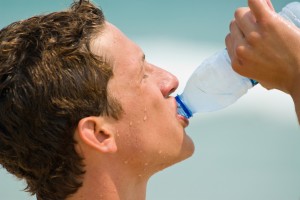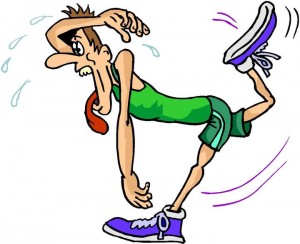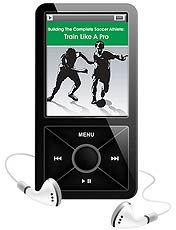Research suggests soccer players need better nutrition
Despite soccer being the most popular sport in the world, there has been little scientific research related to the nutritional needs of soccer players. Thankfully more studies are now being conducted, and the more recent research indicates that soccer athletes need to follow similar nutrition guidelines to marathon runners. At first this connection between high-endurance athletes and soccer players seemed strange to me, because soccer is a power sport involving sprints and explosiveness rather than slow long duration running. But it makes sense when you consider the actual breakdown of the various activities a soccer player will perform during a typical soccer game, which include:
- running at a moderate pace for a total of 10-11 kilometres
- accelerating 40-60 different times
- sprinting for about 800-1200 metres
- changing direction about every five seconds
Now, soccer players still don’t cover the same total distance of a full marathon during a typical game, but they still quickly deplete their muscle’s glycogen stores because of the alternate fast and slow running. It’s the high level of intensity at which soccer athletes exert themselves that speeds up the depletion of glycogen (how the muscles store carbohydrates for energy). Take into account that a soccer match lasts 90 minutes, which is more than long enough to deplete muscle glycogen, and it’s easy to see how this can increase fatigue and reduce athletic performance.
To make matters worse, most players seem to be unaware of their own nutritional needs and the importance of carbohydrates for improving energy and performance. Some studies have shown that many players barely consume 1000 calories from carbohydrates per day (well below the recommended level of 2000-3000!), and so they are entering their matches with already low glycogen levels. No wonder they experience a “crash” when they reach the second half!
Some of the negative effects of low glycogen stores (inadequate carbohydrate consumption) peri-competition can result in:
- Players running up to 50% slower during the second half
- Less total distance being covered during the second half
- Decreased overall quality of play
- Players spending more time walking and less time sprinting
That is why consuming carbohydrates before as well as DURING competition can have such a positive influence. Recent research has demonstrated that players who consumed a glucose (simple carbohydrate) drink during their competitions, vs. a placebo drink, scored more times, allowed fewer goals, increased their contacts with the ball, increased their speed, and were more active, especially during the second half. To consume enough carbohydrate to make a difference in competition, a good strategy is to consume about 12 ounces of a sports drink (about 30-40 grams of carbs) 10 minutes before the game starts, then consume the same amount at half-time.
Soccer players will also benefit from eating a small meal about two hours before competition containing at least 600 calories of carbohydrate. For a few days before any big competition, players should try to reduce the volume and intensity of their training to avoid depleting glycogen stores and to ensure adequate recovery. During this time consume well balanced meals including plenty of carbohydrate. Snacking regularly during the day (eating 5 or 6 times daily) can help ensure that adequate nutrient demands are being met.
 It is also essential for players to make sure they remain well hydrated… fluid intake is VERY important! Soccer athletes lose between 2 and 5 litres of fluid each game through sweating. The can elevate hear rate and body temperature and reduce performance. By consuming the sport drink as recommended above, as well as sipping water or a sports drink throughout the game, can help keep the player hydrated.
It is also essential for players to make sure they remain well hydrated… fluid intake is VERY important! Soccer athletes lose between 2 and 5 litres of fluid each game through sweating. The can elevate hear rate and body temperature and reduce performance. By consuming the sport drink as recommended above, as well as sipping water or a sports drink throughout the game, can help keep the player hydrated.
Finally, players also need to ingest enough carbohydrates (at least 100 grams) after a competition to replenish all the glycogen they lost during the game. They need to drink plenty of fluids (water or sports drink) after competition as well to in order to rehydrate. By following these recommendations a soccer athlete can improve their performance in competition, especially in the second half.
You can learn more about nutrition for soccer athletes, as well as training for speed, strength, and endurance, with our soccer training DVD, Building the Complete Soccer Athlete: Train Like a Pro. This video program also includes over 50 technical drills with the ball, mental conditioning tips, and a training booklet. It is now available as a digital download as well at Soccer Training DVD download.
Are you a coach or player with your own soccer website or blog?
Would you like to make some extra money by offering the DVD download to your online audience? You can sign up as an affiliate for the digital version of our program (available as an online download) by checking out our Affiliate Resource Page. That web page will provide you with everything you need to start promoting and selling our soccer training program on your own website and start earning 75% commissions on every sale. If you are interested or if you have any questions please leave a comment below. We would be happy to have you join our team.
Train smart and play hard,
Josh



Am African And i train twice a day but please send me a meal programe because things are not easy down here so please tell me what to eat, because it kind of looks like am
Hello Derrick,
you can pick up our complete program on DVD at http://www.SoccerAthletics.com or download it at http://www.SoccerAthletics.com/soccer-training-program.php … also remember to subscribe to our newsletter at the top right side as well for more free info.